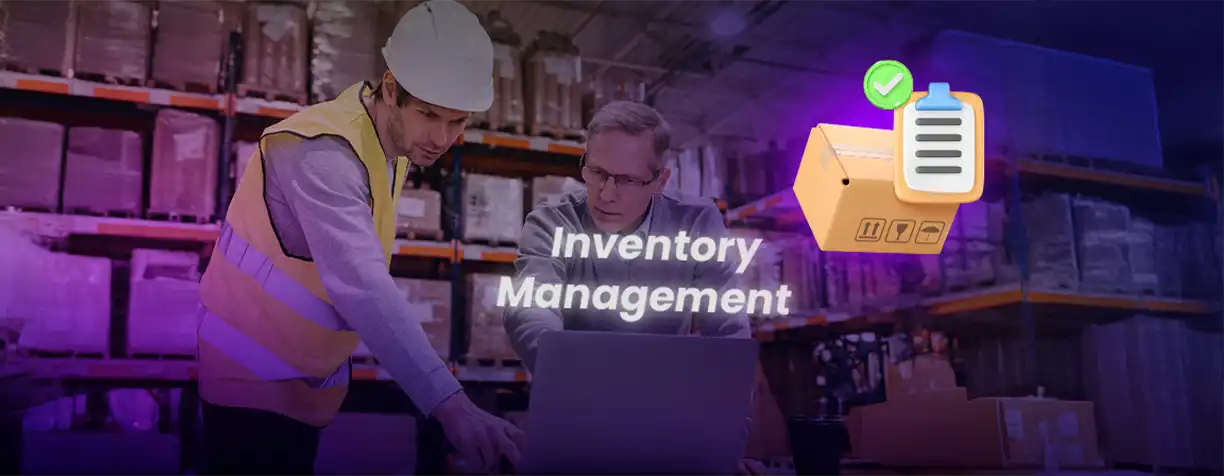In today’s rapidly evolving marketplace, understanding what inventory management is is more than just a basic business function—it’s a strategic necessity. What is inventory management? It is the comprehensive process of overseeing and controlling a company’s stock of raw materials, work-in-progress, and finished goods to ensure optimal levels, reduce costs, and meet customer demand efficiently. With supply chains becoming more complex and customer expectations rising, mastering what is inventory management can be the difference between thriving and merely surviving.
This detailed guide explores what inventory management is, its significance across various industries, the different strategies and techniques employed, the role of third-party logistics (3PL) providers like DelGate, and how modern technology is transforming inventory management practices. We’ll also discuss what is inventory management in logistics, inventory management meaning, what is inventory management in the supply chain, and more, providing you with a complete understanding of this vital business function.
Table of Contents
Understanding What is Inventory Management: Definition and Scope
What is Inventory Management?
What is inventory management? It is the systematic process of tracking, controlling, and optimizing stock levels across various locations and stages of the supply chain. This includes activities such as ordering, storing, and replenishing inventory, as well as using technology to maintain accurate records. At its core, inventory management aims to balance inventory costs with customer service levels to maximize profitability.
Effective inventory management directly influences a company’s cash flow, operational efficiency, and ability to respond swiftly to market changes. It involves strategic decision-making about order quantities, reorder points, safety stock, and lead times. This ensures that inventory levels align with customer demand without resulting in excess stock or shortages.
Inventory Management Meaning

Inventory management encompasses all the essential processes required to ensure that the correct quantity of stock is available exactly when and where it’s needed. It encompasses inventory tracking, warehousing, procurement, and distribution. When you understand what is inventory management in its full context, you realize it’s not just about counting stock but about making informed, strategic decisions that improve overall supply chain performance.
Modern inventory management leverages data, automation, and analytics to provide real-time insights into stock levels, sales trends, and supply chain disruptions. It is a critical component of operational excellence that helps minimize waste, reduce storage costs, and improve service levels.
What is Inventory Management in the Supply Chain
What is inventory management in the supply chain? It refers to managing inventory flows across all points—suppliers, warehouses, distribution centers, and retail outlets. Proper management ensures the seamless movement of goods from procurement to end customer, reducing delays, preventing stockouts, and optimizing inventory turnover.
In the supply chain context, what is inventory management involves integrating demand forecasting, procurement, logistics, and warehousing activities. Effective collaboration between these activities guarantees that the appropriate products are stocked precisely when and where they are needed, helping to reduce overstocking and lowering related expenses.
Inventory Management Definition
The inventory management definition can be summarized as a formalized, strategic approach to overseeing stock levels through procedures, technology, and data analysis. It involves tracking inventory quantities, locations, and movements, as well as planning and executing replenishments based on demand forecasts.
Efficient inventory control helps decrease expenses associated with overstocking, product obsolescence, and running out of stock. It also enhances cash flow, reduces waste, and improves customer satisfaction. Whether done manually or through advanced software, what is inventory management remains central to operational efficiency.
The Role of 3PL Logistics in Canada
Third-party logistics (3PL) providers are increasingly vital for businesses seeking to streamline their inventory management and distribution.
3PL Logistics in Canada
3PL Logistics in Canada offers flexible, scalable warehousing, transportation, and fulfillment solutions tailored for various industries. Leading providers like DelGate operate extensive networks of warehouses strategically located across Canada, including warehouses in Toronto, Kelowna, and Vancouver, enabling local and national distribution.
Partnering with a trusted 3PL Logistics in Canada allows businesses to reduce logistics costs, improve delivery times, and focus on core competencies such as product development and marketing.
Fulfillment Services Canada
Fulfillment Services Canada include handling order management, warehousing inventory, packaging products, and coordinating their shipment. Companies like DelGate provide end-to-end solutions that ensure fast and accurate delivery, which is essential for e-commerce and retail businesses aiming for rapid growth.
Public Warehouse and 3PL Fulfillment
A public warehouse provides flexible storage options without long-term commitments, making it ideal for seasonal or fluctuating inventory needs. Many companies leverage 3PL fulfillment services in Canada to access facilities in Toronto, Kelowna, and Vancouver, ensuring regional stock availability and faster delivery.
Fastest Shipping in Canada
Delivering the fastest shipping in Canada is a critical customer expectation. Through partnerships with DelGate and other reputable 3PL providers, businesses can leverage extensive carrier networks and strategically located warehouses to meet tight delivery windows, especially in major urban centers.
Warehouses in Toronto, Kelowna, and Vancouver
Strategically located warehouses in Toronto, and a 3PL warehouse in Kelowna, enable regional inventory availability, reducing transit times and shipping costs. These facilities, equipped with modern automation, support efficient inventory management and order fulfillment.
3PL Warehouse Services in Canada
3PL Warehouse Services in Canada include inventory storage, order picking, packing, shipping, and reverse logistics. Partnering with experienced providers like DelGate allows businesses to scale operations quickly while maintaining high service levels. With a 3PL Warehouse in Vancouver, companies can benefit from local expertise and faster regional delivery options.
Why Inventory Management is Important

Effective inventory management is crucial for operational excellence. It helps prevent stockouts, reduces excess stock, and ensures prompt order fulfillment. Proper management improves cash flow, minimizes storage costs, and enhances customer satisfaction.
In industries such as retail, manufacturing, and logistics, what is inventory management ensures smooth operations and competitive advantage. It enables businesses to respond swiftly to market demands and adapt to supply chain disruptions.
Inventory Management Strategies
Implementing the right strategies is essential for maintaining optimal stock levels. Some of the most effective include:
- Just-in-Time (JIT) is a strategy that reduces storage expenses by ensuring that materials and products arrive precisely when they are required for manufacturing or sale, avoiding excess inventory.
- Economic Order Quantity (EOQ): Calculates the ideal order quantity that minimizes total inventory costs.
- ABC Analysis: Classifies inventory into categories based on value and turnover, allowing focus on high-priority items.
- Safety Stock Planning: Maintains buffer stock to prevent stockouts during demand fluctuations or supply delays.
- Drop Shipping: Sends customer orders directly from suppliers, reducing the need for holding inventory.
Industry-Focused Inventory Management
Different industries require tailored inventory management approaches. For example, perishable goods need rapid turnover, electronics require precise tracking, and fashion retail benefits from seasonal inventory management. Industry-Focused Inventory Management adapts strategies to sector-specific demands, improving efficiency and profitability.
Inventory Management Techniques
Various techniques help maintain accurate inventory records and optimize stock levels:
- Cycle Counting: Regularly counting portions of inventory to ensure accuracy without disrupting operations.
- Reorder Point Calculation: Using historical data to determine when new stock should be ordered.
- Demand Forecasting: Leveraging sales data and market trends to predict future demand.
- Barcode and RFID Tracking: Automating inventory tracking for higher accuracy and speed.
- Batch Tracking: Managing inventory in specific batches, especially important for regulated products.
Combining these techniques with inventory management software enhances data integrity and operational efficiency.
Inventory Management Tools and Software
Contemporary inventory management systems offer instant insights into current stock quantities, automatically trigger reorder notifications, and produce comprehensive reports to streamline inventory oversight. Popular options include DelGate’s proprietary inventory management solutions, tailored for Canadian businesses.
Using these tools reduces manual errors, saves time, and supports data-driven decisions. Integration with e-commerce platforms, ERP systems, and logistics providers streamlines the entire supply chain, making what is inventory management more manageable and effective.
Examples of Inventory Management
To better understand what is inventory management, it helps to look at real-world examples. Companies like Amazon and Walmart have perfected their inventory systems by implementing real-time tracking and demand forecasting, allowing them to keep shelves stocked while avoiding excess. Fashion retailers like Zara use fast inventory turnover techniques to quickly adapt to trends, minimizing leftover stock. Electronics giants such as Apple manage their components with precision, ensuring they meet production schedules without overstocking. These examples show that effective inventory management is about balancing accuracy, speed, and flexibility to meet market demands and maximize efficiency.
Examples of Companies Excelling in Inventory Management
Many industry leaders have mastered what is inventory management to optimize their operations:
| Company | Industry | Inventory Management Method | Results |
| Amazon | E-commerce | Real-time inventory tracking | 20% faster delivery, 15% reduction in stockouts |
| Walmart | Retail | JIT and ABC analysis | 10% lower inventory costs, improved turnover |
| Apple | Electronics | Tight component control | Reduced lead times by 25%, increased production efficiency |
| Zara | Fashion | Fast inventory turnover | Sales increased by 18%, markdowns reduced |
| Dell | Manufacturing | Build-to-order | Minimized inventory holding costs, faster order fulfillment |
(Source: Industry Reports 2023)
The Future of Inventory Management
Technological innovations continue to revolutionize what is inventory management. AI-powered demand forecasting, IoT sensors, blockchain for transparency, and cloud-based systems are transforming supply chain operations. These advancements enable businesses to be more agile, responsive, and efficient.
For Canadian companies, adopting inventory management solutions like those offered by DelGate ensures they stay competitive and meet rapidly changing customer expectations.
Why Choose DelGate as Your 3PL Partner in Canada
DelGate is renowned as the best 3PL Canada provider, offering comprehensive 3PL warehouse services in Canada. Their extensive network includes facilities in Toronto, Kelowna, and Vancouver, providing strategic advantages for regional distribution.
Their expertise in fulfillment services Canada and 3PL fulfillment helps businesses scale operations efficiently, reduce logistics costs, and achieve the fastest shipping in Canada. With advanced inventory management software and customized inventory management solutions, DelGate supports your growth at every stage.
Inventory Management Methods
Different Inventory Management Methods suit various business models and industry needs. These include:
- Perpetual Inventory System: Continuous tracking using barcode, RFID, or software.
- Hybrid Systems: Combining perpetual and periodic approaches.
- Drop Shipping: Outsourcing inventory storage and shipping directly from suppliers.
- Vendor-Managed Inventory (VMI): Suppliers manage stock levels directly, ensuring optimal availability.
Selecting the appropriate method is essential to improve accuracy, reduce waste, and optimize costs.
Benefits of Using Inventory Management Software and Solutions

Implementing inventory management software offers numerous benefits:
- Real-time inventory visibility across multiple channels
- Automated reordering and stock alerts
- Reduced manual errors and labor costs
- Enhanced demand forecasting accuracy
- Better warehouse organization and efficiency
Inventory management solutions like those provided by DelGate are vital for businesses aiming for scalability and agility. They enable smarter decision-making and seamless integration with other business systems.
Conclusion
Understanding what is inventory management and employing the right strategies, techniques, and tools can dramatically improve your business operations. Effective inventory management minimizes costs, maximizes customer satisfaction, and provides a significant competitive advantage. Partnering with a reliable 3PL like DelGate ensures you leverage the best inventory management solutions and stay ahead in a fast-paced market.
Adopt modern technology, tailor your inventory management methods to your industry, and continuously optimize your processes to foster growth, resilience, and customer loyalty.





